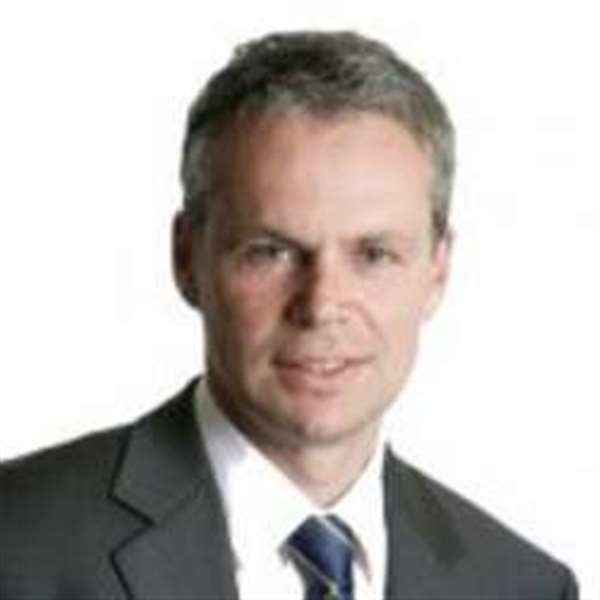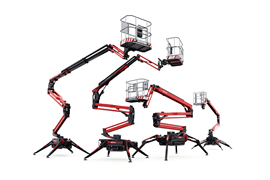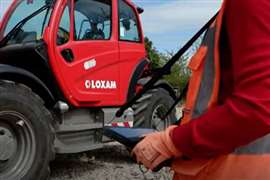What’s behind the growth of the power rental market?
20 September 2022
Driven by factors from energy uncertainty to electrification, power rentals look set to be a strong performer over the medium term, with agility the key to success. Belinda Smart reports.
According to Fortune Business Insights’ recent ‘Power Rental Market, 2021-2028’ report, the global power rental market is projected to grow from $9.78 billion in 2021 to $16.70 billion in 2028 at a CAGR of 7.9% in forecast period, 2021-2028.
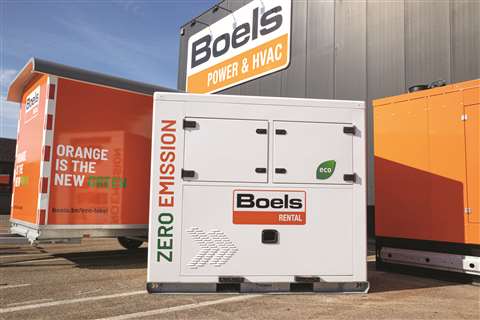 Boels reports that power rentals’ growth is in part driven by electrification. (Photo: Boels)
Boels reports that power rentals’ growth is in part driven by electrification. (Photo: Boels)
This makes sense given current conditions; power rentals offer benefits in terms of flexibility of supply - and of products suited to diverse power ratings, and they require minimal maintenance for end-users. They are also positioned at the front line of the energy transition.
Power rental growth driven by electrification
According to Davy de Wilde, Technical Specialist at Boels Power & HVAC, a critical driver is equipment electrification; initially, the transition to electric was supported by the grid, but due to increasing grid congestion - especially in the Netherlands – many companies are forced to arrange temporary power supplies to make up for this, he tells IRN.
“In most cases, this is still done with diesel generators,” says de Wilde. “This translates into a growth of up to 10 per cent a year for such machines and their accessories. We expect this growth to increase further as electrification proceeds and grid congestion cannot be resolved immediately.
Economics are also a driver, as cost efficiencies gain urgency. “This translates into a generator setup or a hybrid setup with generator and battery pack,” says de Wilde, who adds that customers are increasingly using consumption reports to gain more insight into possible savings.
“Boels has remote monitoring/control of the entire fleet so that we can help analyse the data ourselves and give advice. And due to the increasing complexity of the setups, there is also a growing demand for total care.”
These developments should be seen in light of current energy challenges, which de Wilde says affect the rental business for power solutions both positively and negatively.
“Huge strides are being made in the field of technology from the manufacturers. In addition, more and more technologies can be combined, even between different manufacturers.”
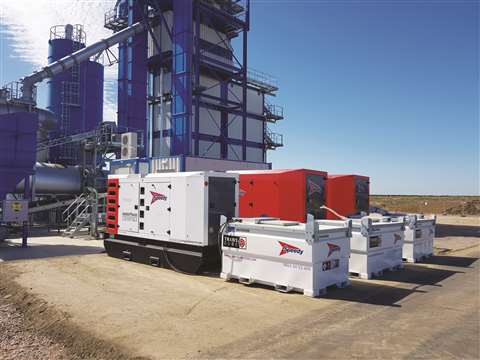 Innovation is “the silver lining” of a challenging energy market, according to UK renter Speedy. (Photo: Speedy)
Innovation is “the silver lining” of a challenging energy market, according to UK renter Speedy. (Photo: Speedy)
Not so upbeat is the fact that, due to the “enormous increase” in the required power, “many machines will be hired in the short term to compensate for the shortages in the grid.
For example, high gas prices have led many to switch back to diesel solutions – in other words diesel generators instead of CHP (combined heat and power).”
Due to the confluence of various issues - material shortages, rising prices, time pressure to innovate, and the environment, it is a challenge to get materials and machines.
De Wilde says the shift towards renewable technologies requires a move to “drastically change the interaction between customer and supplier.”
“This has to become even more of a bi-directional dialogue, which makes it possible to adapt even better to the needs of the customer or the project.”
“New renewable sources, by definition, have more limitations that customers are not used to working with. The necessary information is therefore usually not available - or is not complete - at the time of the application or the start of the project. We are hugely committed to open dialogue, and not only before the project but also during and after.”
Has demand for cleaner energy increased in the rental sector?
Rental operators have the power to influence the rental landscape, and Sunbelt in the UK is aiming to do that, Christian Spence, Head of Clean Energy tells IRN.
Sunbelt has built a profile for what it describes as “the UK’s largest rental fleet” of battery storage units. These work alongside more traditional temporary power solutions such as generators, by installing a battery storage unit alongside a generator on sites.
They can reduce generator run time by an average of 50%, reducing fuel consumption by 50%.
“We’re seeing a real focus and demand on cleaner energy solutions from our customers, and we’ve responded by investing in a wide range of solutions that can deliver real results,” says Spence.
“This includes the supply of HVO fuel, where we have seen a sharp increase in demand since the change in red diesel usage. We supply HVO fuel to our customer in conjunction with our strategic partners that has been sustainability sourced.”
Sunbelt is also utilising energy management systems, which control energy consumption on sites, suppressing peak loads and turning off unnecessary devices.
Peak power support systems like its Flywheel utilise formula one technology, which captures energy that would often be wasted, and re-distributes it when needed to support dynamic loads such as hoists and tower cranes.
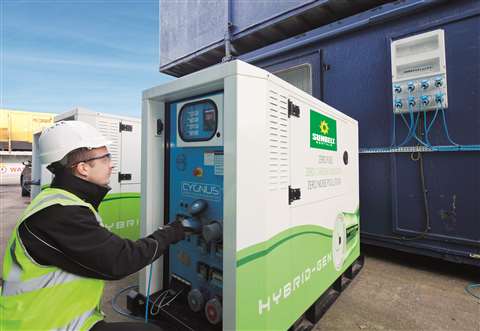 Demand for cleaner energy solutions is driving power rentals at Sunbelt Rentals UK. (Photo: Sunbelt Rentals)
Demand for cleaner energy solutions is driving power rentals at Sunbelt Rentals UK. (Photo: Sunbelt Rentals)
There is also a growing demand for solar, which has come a long way in the past few years, he says.
“Solar technology is now an effective renewable energy source, used in the UK and as a business Sunbelt Rentals has invested heavily in solar powered equipment such as lighting and accommodation units as well as solar arrays that can deliver power to site.”
Energy uncertainty accelerates use of alternative power
“The silver lining of the challenging energy market is that it is encouraging businesses to think differently, and this is driving innovation,” Nick White, Sales director, Power at Speedy Hire UK tells IRN.
“A focus on global climate change is driving responsible businesses to make better fuel choices such as low carbon Hydrotreated Vegetable Oil, which we now supply to customers as an alternative to traditional diesel. This is helping contractors to cut carbon emissions in their power generation by 90%.
“And by retrofitting our Stage IIIa generators to the Stage V emission compliant standard, we are ensuring the availability of models that meet the latest regulations and cushioning the blow of supply chain challenges for customers.
“Overall, we’re seeing strong demand across our whole fleet, particularly for customers working across housebuilding, civil engineering, general construction and infrastructure projects. And it is more important now than ever before for hire providers to work closely with their customers to provide the customised products and solutions they need.”
Versatile generator fleets
“Generator rentals play a huge role in our business and more importantly in our profitability,” Jabbok Schlacks, CEO of US company EquipmentShare tells IRN. “They are a constant need. There is no off-season for generator rentals.”
He says all the company’s generators of 200kw and above have been designed with the same control platform, which allows up to 32 to work in parallel. This can be done for any mix of generators ranging from 200kw to 1170kw.
“Being able to run multiple generators in parallel allows us versatility of design, which leads to better fleet utilisation.
“The demand for clean emissions has raised the bar for the production of temporary power and has improved exponentially in the past decade. There is little margin for error when sizing today’s Tier 4 generators, and in turn the chance of equipment failure is greatly increased.
“Producing temporary power that meets Tier 4 emission standards requires a thorough understanding of project load requirements and their relation to sizing the appropriate generator.
“Customers are looking for reliable and cost-efficient solutions; they are seeking expert guidance in identifying the appropriate equipment for the application.”
OEMs must keep up with demand for renewable fuels
Customer demand is also a driver for OEMs; Trey Ragsdale, VP Marketing at Atlas Copco Power and Flow tells IRN agility is critical.
“For example, demand for renewable fuels, such as HVO, is projected to triple over the next 20 years. It will affect the rental business as they must be ready to meet their clients’ needs and new regulations limiting emissions.
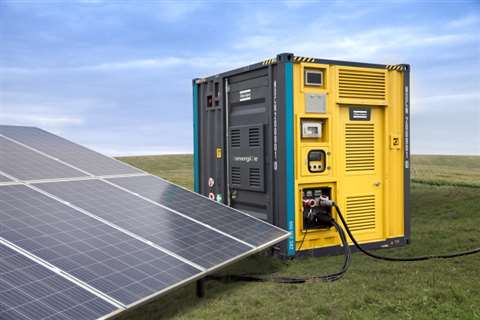 Atlas Copco: rental companies can cater to a dynamic energy market with hybrid solutions, consisting of energy storage systems and generators. (Photo: Atlas Copco)
Atlas Copco: rental companies can cater to a dynamic energy market with hybrid solutions, consisting of energy storage systems and generators. (Photo: Atlas Copco)
“Another energy challenge affecting the rental business is energy investments may need to grow 4% a year to support the energy transition, with new technologies capturing more than 65% of the investments by 2035.
“Renewables are projected to account for more than 30% of global investments in the next 15 years (excluding transmission and distribution reinforcements).
“This is twice as high as projected investments in conventional power generation, and almost on par with oil and gas investments. It will impact the rental businesses because it will need to ensure they keep up with the new technologies to guarantee the energy transition.”
He tells IRN, rental companies can face these challenges with hybrid solutions consisting of energy storage systems and generators. Energy storage solutions featuring long-life, low maintenance, and high-density Lithium-ion (Li-on) batteries, working in hybrid mode with diesel-driven/HVO compliant generators are one solution for companies operating in demanding and noise-sensitive applications.
Are diverse trends impacting rental?
Meanwhile Clive Dix, Managing Director at Himoinsa Power Solutions (UK) concurs that diverse energy trends are influencing the market.
“Hire companies that have already purchased low emission, fuel efficient products that can use HVO as a drop in fuel are able to offer lower carbon solutions than previously, there will continue to be a market for diesel generation for many years.
“However, as we know the running costs linked to diesel prices, removal of tax relief on diesel (in UK) and OEM production costs continue to increase as we see the automotive industry reducing diesel engine manufacture, this makes LPG and battery generation very attractive from an OPEX and Capex point of view as a long term solution and reduces any concerns about fuel security.”
“Therefore, hire companies that are investing in Battery and LPG generation are playing in first field and those investing further in diesel generation are playing in another, so today the hire market is more diverse and there is no one solution for all.”
Alessandro Rossi – Business Unit Director Mobile Products at Pramac Generac Mobile Group, tells IRN; “Rental companies are primarily looking for solutions that guarantee a quick return on investment, high reliability, safe use, and low operating costs,” adding that the company has recently also noticed a critical increase in more stringent demands, especially in terms of sustainability.
“This is one of the reasons why the group decided to introduce and keep developing new eco-friendly products that reduce or even eliminate environmental impact, using the most recent technologies such as Stage V engines, rechargeable batteries, and photovoltaic energy.”
“Rental companies are also focused on products that guarantee greater flexibility of use, so that they can limit the size of their rental fleets.”
Adaptability is key for the future of power rental
Meanwhile Nicholas Protais, Managing Director at UK power specialist Aggreko tells IRN Stage V generators are performing particularly well, “due to the increasingly strict environmental legislation that end users are subject to.”
“Due to the volatility of grid connections, the majority of our customers are looking to procure decentralised energy solutions to help decrease their reliance on their mains power supply.
“The concept of energy storage also continues to grow in popularity, with many viewing this as a means of meeting demand during particularly busy periods. In a rapidly evolving market, it is crucial to be adaptable.”
STAY CONNECTED



Receive the information you need when you need it through our world-leading magazines, newsletters and daily briefings.
CONNECT WITH THE TEAM
